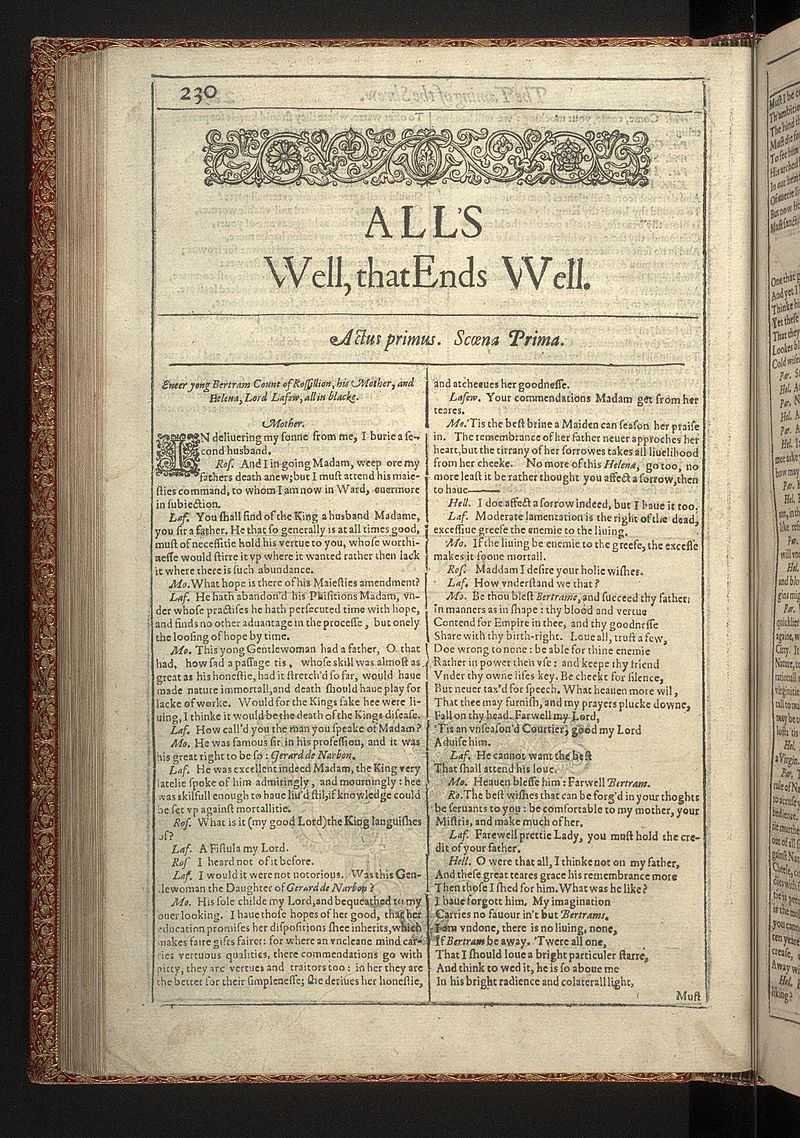All's Well That Ends Well
All's Well That Ends Well is a play by William Shakespeare. Some academics believe it to have been written between 1604 and 1605. It was published in the First Folio in 1623.
Though originally the play was classified as one of Shakespeare's comedies, the play is now considered by some critics to be one of his problem plays, so named because they cannot be neatly classified as tragedy or comedy. It is not among the playwright's most esteemed plays, with literary critic Harold Bloom writing that no one, "except George Bernard Shaw, ever has expressed much enthusiasm for All's Well That Ends Well."

Capsule summary
Helena, the low-born ward of a French-Spanish countess, is in love with the countess's son Bertram, who is indifferent to her. Bertram goes to Paris to replace his late father as attendant to the ailing King of France. Helena, the daughter of a recently deceased doctor, follows Bertram, ostensibly to offer the King her services as a healer. The King is sceptical, and she guarantees the cure with her life: if he dies, she will be put to death, but if he lives, she may choose a husband from the court.
The King is cured and Helena chooses Bertram, who rejects her, owing to her poverty and low status. The King forces him to marry her, but after the ceremony Bertram immediately goes to war in Italy without so much as a goodbye kiss. He says that he will only marry her after she has borne his child and wears his family ring.
In Italy, Bertram is a successful warrior and also a successful seducer of local virgins. Helena follows him to Italy, befriends Diana, a virgin with whom Bertram is infatuated, and they arrange for Helena to take Diana’s place in bed. Diana obtains Bertram’s ring in exchange for one of Helena’s. In this way Helena, without Bertram’s knowledge, consummates their marriage and wears his ring.
Helena returns home to the countess, who is horrified at what her son has done, and claims Helena as her child in Bertram’s place. Helena fakes her own death. Bertram, thinking he is free of her, comes home. He tries to marry a local lord’s daughter, but Diana shows up and breaks up the engagement. Helena appears and explains the ring swap, announcing that she has fulfilled Bertram’s challenge; Bertram, impressed by all she has done to win him, swears his love to her. Thus all ends well.
There is a subplot about Parolles – a disloyal associate of Bertram’s. A recurring theme throughout the play is the similarity between love and war: conquering, seducing, betraying, outmaneuvering.

















0 comments
Sign in or create a free account